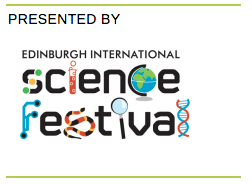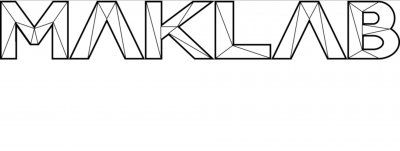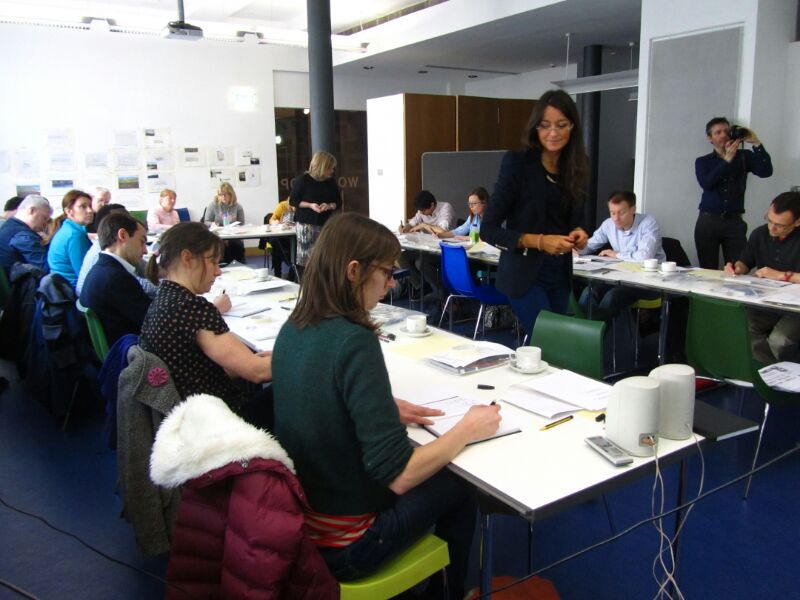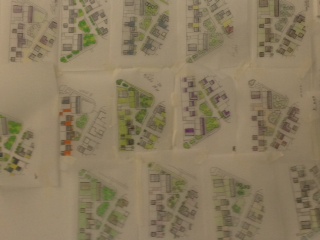Yasmin Ali
Urbanism // Design
Goodbye Glasgow Games
August 4th, 2014

Forget Usain Bolt's runaway remark, Glasgow's Games were really positive, and not just for the sporting heroes and fans - here's a snapshot of the key cultural happenings to supplement the sporting events:
1. We Are Panel
Too many arts activities to do mention, but one standout strand was the souvenir project and programme run by Panel Glasgow, based in the foyer of South Block Studios. Every purchase received a special edition medal set of Tunnock's Teacakes.
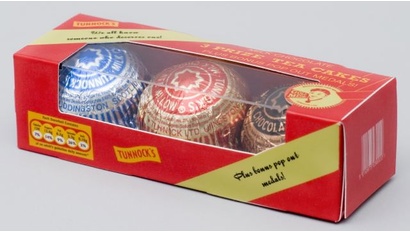
Special Edition Teacakes by Tunnock's
2. The Empire Cafeì
Across the way over at The Briggait, The Empire Cafeì held a series of discursive and reflective events exploring Scotland's connection with the Slave Trade, reminding us of the historic disparity in fortunes within the Commonwealth. Its beautiful, minimalist branding by Graphical House has had the design circles talking.
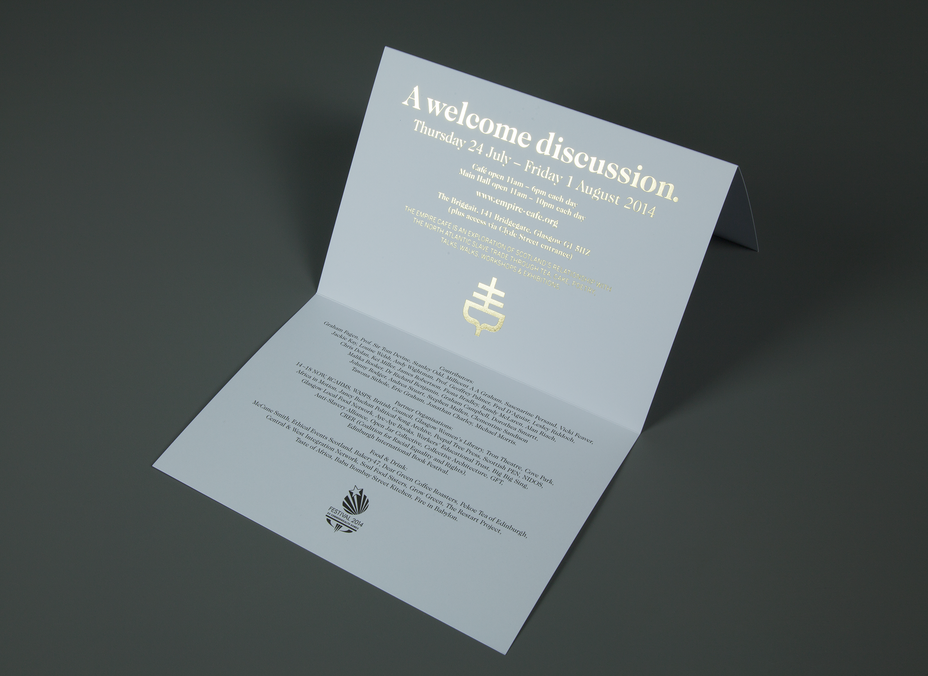
The Empire Cafeì Branding by Graphical House
3. Glasgow Mix Tape
On the rainy penultimate day of the Games, East End Social hosts a gig on The Green with a bill glittering with Glaswegian stars to be proud of - all for free.
4. Pop-up events and premises
There were lots of interesting pop-up stalls as part of Shedzone within the Green, and also along High Street. The Pop-up Fish Plaice Kitchen & Bar has been particularly successful and had its run extended until the 14th.
5. Last but not least...Legacy
It's not just about those 11 days - there is a programme in place to extend the regeneration initiatives catalysed by The Games, as well as the conversion of The Athlete's Village.
// Read more about it at www.legacy2014.co.uk

Edinburgh Mini Maker Faire @ EISF
April 22nd, 2014
Last Sunday multi-platform arts venue Summerhall played host to Edinburgh's second annual Mini Maker Faire, which also marked the end of this year's Edinburgh International Science Festival. Billed as 'a celebration of DIY culture in all its shapes and forms', it was a great chance to meet local craftspeople and groups, as well as very much a family event with activities for all ages.
There was a programme of talks and workshops, with Gunnar Groves-Raines of Edinburgh-based architectural practice GRAS among the speakers. Glasgow-based product design engineering centre MAKLAB were on hand with activities to try out, as were Summerhall residents Edinburgh Hacklab with laser cutting demonstrations.
It was a good chance to meet lesser-known groups such as Leith Lapidary Club which ran some popular enamelling drop-in sessions. Also open for tours was Summerhall's own in-house Gin distillery, Pickerings, with a piped supply going straight on tap to the Royal Dick bar on the Summerhall campus.
// The Mini Maker Faire is part of an international movement and programme of events. A larger event takes place in Newcastle this weekend (26-27th April).
MAKLab Resin Casting @ EISF
April 16th, 2014
MAKLab ran a novel workshop introducing Resin Casting to novices at this year's Edinburgh International Science Festival. Attendees were introduced to not only how to dye and cast resin polymer, but also firstly how to cast a mould forming the inverse of a desired form out of silicone. The silicone is fast-setting and produced a reusable mould from which duplicate resin casts could be made.
Casting the mould
1. It helps to use a plastic or similar frame stuck to a flat base as a surround. The object you wish to make a cast is then stuck temporarily to this base. It needs to be flush with the base.
2. The silicone and its catalyst are then mixed in equal measures and poured immediately into the mould.
3. Within around ten minutes the mould is set and can be disassembled from the frame.
Casting resin
1. The resin and its catalyst used in this case are mixed in equal measures.
2. The mixed resin must be poured straight after mixing as it is fast-setting. At this point it can be coloured using a drop of dye.
3. Within around ten minutes the resin is set and the piece can be separated from the mould.
about the organisers
MAKLab is an open-access member makers' workshop based in Glasgow. They recently moved from the Lighthouse to larger premises and are now based in Charing Cross. They have further plans for expansion, including a possible Edinburgh base, and a mobile MAKLab like this one, appearing at the upcoming Edinburgh Makers' Faire.
EISF 2014 runs 5-20th April and various venues around central Edinburgh. There are events daily for all the family, including workshops and talks, and theme nights. Many events are free; the full programme can be viewed online and in the official brochure.
// With Thanks to EISF Press Office
A+DS Design Skills Symposium, March 2014
April 7th, 2014Image Courtesy A+DS
Architecture + Design Scotland hosted their fourth Design Skills Symposium, this year at the Chris Hoy Velodrome in Glasgow, with site visits in Dalmarnock, Sighthill and Port Dundas. Planned as a learning event running over two consecutive full days for built environment professionals, the programme featured a packed schedule including an itemised itinerary for site visits.
Day 1 included a morning of talks led by opening address from Jim MacDonald, the Chief Executive of A+DS and a ministerial address from Derek Mackay, Minister for Local Government and Planning. Notably, many of the attendees were planners, several of whom had benefited from a primer workshop the previous month focusing on drawing skills.
The keynote address was given by Geoffrey London, a government architect from Melbourne who gave an interesting perspective on architecture and civic regeneration, introducing several innovative projects. London referred to some Scottish policy as being amongst the world's best practice in championing design policy and as a precedent for advocating good design. He spoke of several recurring issues common to major building projects and guides and mechanisms the local authority had implemented to remedy these. Of note was the new procurement relationship known as an alliance which obviates blame from all parties within the project by conferring shared responsibility amongst the client, contractor and architect. In the alliance, there are financial incentives for meeting targets to ensure key performance indicators are met. London also introduced fifteen buildings from his state, many as a result of international architectural ideas competitions. He also gave an illustrated talk on Melbourne's regeneration from an empty centre in the eighties, to a lively, youthful and vibrant city. He leaves us with to question whether Melbourne has become a victim of its own success, with disproportionate investor-owned central residential properties making it unaffordable to many young workers to own a property.
The talks were concluded by homegrown perspectives to pave the way for the event's site visits in the afternoon and the proceeding workshops the following day. Glasgow's approach was discussed by Clyde Gateway's Director of Development Martin McKay and Glasgow's City Design Advisor Gerry Grams. Overall, the East End's transformation for the advent of the Commonwealth Games is a tale of optimism, but it's part of a wider 20-year Development Framework planned for the Clyde Gateway area. Gerry Grams spoke broadly of the discrepancies in quality of life and built environment between east and west neighbourhoods, and the aspirations for the East End, as well as a detailed look at the masterplan for the Commonwealth Games and post-games legacy.
// With Thanks to A+DS & My Pinkie Promise
Event: Drawing Places Workshop, 27 February
March 3rd, 2014
In advance of the A+DS event Design Skills Symposium, The Scottish Government ran a primer workshop based on drawing skills called Drawing Places, in conjunction with A+DS. The workshop was aimed at built environment professionals from non-design backgrounds and particularly relevant to planners. The lessons and techniques learned from Drawing Places are designed to be transposable to the masterplanning session at the forthcoming Skills Symposium.
The workshop also served to remind professionals of how design skills, and spatial awareness, are important to the town planning profession. Many of the attendees started the day professing not being able to draw yet produced well considered, high quality drawn responses, as shown in this selection of images. Attendees praised many aspects of the day's lessons, including discovering the joy of sketching and the ability of sketches to bring ideas to life.
Delegates were also keen to take the knowledge gained back to their offices. One local authority attendee is thinking of rolling out a similar programme as lunchtime CPD sessions for Development Standards and Development Planning Officers.
// With thanks to Susie Stirling who led the workshop with contributions from JMArchitects and Anderson Bell Christie.


